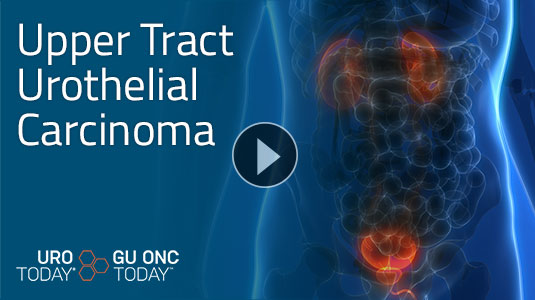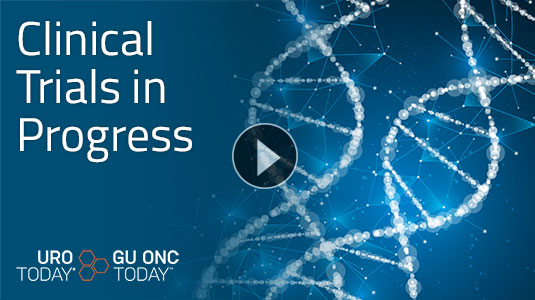SUO 2024: Efficacy and Safety of Padeliporfin VTP for Treatment of Low-Grade UTUC: ENLIGHTED Phase 3 study
Presented by Vitaly Margulis, MD
The 2024 SUO annual meeting included a urothelial carcinoma session, featuring a presentation by Dr. Vitaly Margulis discussing the ENLIGHTED phase 3 study assessing efficacy and safety of padeliporfin vascular targeted photodynamic therapy (VTP) for treatment of low-grade upper tract urothelial carcinoma. Padeliporfin VTP is a combination product:
Read More
SESAUA 2024: A National Analysis Evaluating the Role of Lymph Node Dissection in Patients with High-Risk Upper Tract Urothelial Carcinoma
Presented by Saad Sabbagh, MD
The 2024 Southeastern Section of the AUA (SESAUA) annual meeting featured a bladder cancer session and a presentation by Dr. Saad Sabbagh discussing a national analysis evaluating the role of lymph node dissection in patients with high-risk upper tract urothelial carcinoma.
Read More
AUA 2023: Efficacy and Safety of Mitomycin Gel (UGN-101) as an Adjuvant Therapy After Complete Endoscopic Management of Upper Tract Urothelial Carcinoma
Presented by Craig Labbate, MD
The 2023 American Urological Association (AUA) annual meeting held in Chicago, was host to an upper tract transitional cell carcinoma podium session. Dr. Craig Labbate presented the results of a study analyzing the efficacy and safety of mitomycin gel (UGN-101) as adjuvant therapy following complete endoscopic management of upper tract urothelial carcinoma (UTUC).
Read More
AUA 2023: An Adaptable Approach: Is JELMYTO® Appropriate Across Low-Grade UTUC Presentations and Practice Patterns?
Presented by Jennifer A. Linehan, MD & Sandip M. Prasad, MD, MPHil
The 2023 American Urological Association (AUA) annual meeting held in Chicago, IL between April 28 and May 1st, 2023, was host to a Product Theater in the Square session, sponsored by UroGen® Pharma. Drs. Jennifer Linehan and Sandip Prasad discussed the utility, efficacy, and safety of JELMYTO across low-grade upper tract urothelial carcinoma (UTUC) presentations and practice patterns, using adaptable patient and physician-centered approaches.
Read More
AUA 2023: Panel Discussion: Management of Upper Tract Urothelial Carcinoma
Presented by Surena Matin, MD
The 2023 American Urological Association (AUA) annual meeting held in Chicago, IL between April 28 and May 1st, 2023, was host to a plenary session that included a panel discussion for the management of upper tract urothelial carcinoma (UTUC). This discussion was moderated by Dr. Surena Matin, and included Drs. Jay Raman, Tomonori Habuchi, and Sima Porten as panelists.
Read More
AUA 2023: AUA Guidelines: Upper Tract Urothelial Carcinoma (UTUC)
Presented by Jonathan A. Coleman, MD
The 2023 American Urological Association (AUA) annual meeting held in Chicago, IL between April 28 and May 1
st, 2023, was host to a plenary session, with Dr. Jonathan Coleman presenting the first iteration of the AUA/SUO guidelines for the diagnosis and management of non-metastatic upper tract urothelial carcinoma (UTUC).
Read More
EAU 2023: State-of-the-Art Lecture: Immunotherapy in Locally Advanced and Metastatic UTUC: A Reality?
Presented by Maria De Santis, MD, PhD
The 2023 EAU annual meeting included an EAU guideline session on effective treatment in upper tract urothelial tumors, featuring a state-of-the-art presentation by Dr. Maria De Santis discussing immunotherapy in locally advanced and metastatic upper tract urothelial carcinoma.
Read More
EAU 2023: State-of-the-Art Lecture: Evidence for Neoadjuvant Treatment Before Radical Nephroureterectomy
Presented by Thomas Seisen, MD
The 2023 EAU annual meeting included an EAU guideline session on effective treatment in upper tract urothelial tumors, featuring a state-of-the-art presentation by Dr. Thomas Seisen discussing the evidence for neoadjuvant treatment before radical nephroureterectomy.
Read More
EAU 2023: State-of-the-Art Lecture: Improvement in Technologies and Drugs to Support Kidney Sparing Surgery
Presented by Joyce Baard, MD
The 2023 EAU annual meeting included an EAU guideline session on effective treatment in upper tract urothelial tumors, featuring a state-of-the-art presentation by Dr. Joyce Baard discussing improvement in technologies and drugs to support kidney sparing surgery.
Read More
EAU 2023: State-of-the-Art Lecture: Role of Systemic Chemotherapy After Radical Nephroureterectomy
Presented by Alison J. Birtle, MD
The 2023 EAU annual meeting included an EAU guideline session on effective treatment in upper tract urothelial tumors, featuring a state-of-the-art presentation by Dr. Alison Birtle discussing the role of systemic chemotherapy after radical nephroureterectomy.
Read More
SUO 2022: Long-term Outcomes of Treatment with UGN-101, A Mitomycin-containing Reverse Thermal Gel, For Primary Chemoablation of Low-grade Upper Tract Urothelial Carcinoma (LG UTUC)
Presented by Phillip M. Pierorazio, MD
The poster session focusing on Bladder and Kidney cancer was held at the Annual Meeting of the Society of Urologic Oncology. In this session, Dr. Phillip M. Pierorazio presented long-term outcomes for patients treated with UGN-101 for low-grade upper tract urothelial carcinoma (UTUC).
Read More
SUO 2022: Comparison of Administration Route for UGN-101 on Upper Tract Urothelial Carcinoma: A Multi Center Evaluation
Presented by Josh Gottlieb, DO
A poster session focusing on Bladder and Kidney cancer was held at the Annual Meeting of the Society of Urologic Oncology and in this session, Dr. Josh Gottlieb presented results of a multi-center study examining alternative routes of administration for UGN-101.
Read More
SUO 2022: Early Experience with UGN-101 for the Treatment of Upper Tract Urothelial Cancer – A Multi-Center Evaluation of Practice Patterns and Outcomes
Presented by Jacob Taylor MD, MPH
A poster session focusing on Bladder and Kidney cancer took place at the Annual Meeting of the Society of Urologic Oncology and in this session, Dr. Jacob Taylor presented the results of a multi-center study examining the early clinical experience with the use of UGN-101.
Read More
EAU 2022: State-of-the-art Lecture Landscape of Current Trials with Intravesical Treatment in High Risk BCG naïve NMIBC
Presented by Ashish M. Kamat, MD, MBBS
The 37th Annual European Association of Urology Congress held in Amsterdam, Netherlands between July 1st, and 4th 2022 was host to a plenary session on perioperative treatment of urothelial cancers in 2022. Dr. Ashish Kamat expertly discussed the landscape of current trials with intravesical treatment in high-risk BCG naïve non-muscle invasive bladder cancer (NMIBC).
Read More
AUA 2022: Longitudinal Health-Related Quality of Life Outcomes in Adults with Non-Muscle-Invasive Bladder Cancer Receiving a Chemoablative Gel as a Primary Treatment (Optima II: Phase 2b, single arm, open-label trial)
Presented by Angela Smith, MD, MS
The 2022 Annual Meeting of the American Urological Association was host to a moderated poster session for non-invasive bladder cancer. Dr. Smith presented the health-related quality of life outcomes results for low-grade non-muscle invasive bladder cancer (LG NMIBC) patients receiving UGN-102, a mitomycin containing reverse thermal gel.
Read More
AUA 2022: A Multicenter Study of 2-year Outcomes Following Hyperthermia Therapy with Mitomycin C in Treating BCG Unresponsive Non-Muscle Invasive Bladder Cancer: Recirculant Hyperthermic Intravesical Chemotherapy
Presented by Andrew Stemberger
The 2022 Annual Meeting of the American Urological Association was host to a moderated poster session for non-invasive bladder cancer. Dr. Andrew Stemberger presented the 2-year follow up results of BCG-unresponsive NMIBC patients treated with hyperthermic Mitomycin C.
Read More
AUA 2022: Antegrade Administration of Reverse Thermal Mitomycin Gel for Primary Chemoablation of Upper Tract Urothelial Carcinoma via Percutaneous Nephrostomy Tube: a Multi-Institutional Real-World Experience
Presented by Kyle Rose, MD
The 2022 Annual Meeting of the American Urological Association was host to a podium presentation by Dr. Kyle Rose from Moffitt Cancer Center who presented real-world data on the antegrade administration of reverse thermal mitomycin (JEMLYTO®) for primary chemoablation of upper tract urothelial carcinoma (UTUC) via a percutaneous nephrostomy tube.
Read More
AUA 2022: Chemoablation as Primary Treatment: Transforming the Paradigm for Low Grade UTUC with JELMYTO®
Presented by Jennifer A. Linehan, MD
The 2022 Annual Meeting of the American Urological Association was host to an exhibition hosted by UroGen® and presented by Dr. Jennifer Linehan. Dr. Linehan began her presentation by highlighting that the long-term standard of care has delivered suboptimal outcomes for low-grade upper tract urothelial cancer (LG-UTUC) patients.
Read More
AUA 2022: Interim Results From a Phase 1B Clinical Trial Evaluating Tolerability and Activity of FGFR Inhibition in Localized Upper Tract Urothelial Carcinoma
Presented by Surena F. Matin, MD
In a podium presentation in the Late-Breaking Abstracts session at the 2022 American Urologic Association Annual Meeting held in New Orleans and virtually, Dr. Matin presented the results of a phase Ib trial assessing the tolerability and activity of FGFR inhibition in patients with localized upper tract urothelial carcinoma (UTUC)
Read More
AUA 2022: Adjuvant Therapy after Nephroureterectomy for High-Risk Upper Tract Urothelial Carcinoma
Presented by Sima Porten, MD, MPH
The 2022 American Urological Association (AUA) Annual Meeting included the Society of Urologic Oncology (SUO) session and a presentation by Dr. Sima Porten discussing adjuvant therapy after nephroureterectomy for high-risk upper tract urothelial carcinoma.
Read More
AUA 2022: Ureteroscopic Thulium Laser Lithotripsy Augmented with a Novel Reverse Thermal Hydrogel in an In-Vivo Porcine Model
Presented by Douglas Schneider,
The Engineering and Urology Society included a poster session featuring work from Douglas Schneider and colleagues presenting results of their study assessing thulium laser lithotripsy augmented with a novel reverse thermal hydrogel (Hydrogel) developed by UroGen Pharma in an in-vivo porcine model. \
Read More
SES AUA 2022: Are Metachronous Bladder Tumors Predictive of Upper Tract Urothelial Carcinoma Recurrence in Patients Treated with Radical or Endoscopic Surgery
Presented by Christian Ericson, MD
The 2022 Southeastern Section of the AUA’s annual meeting included a bladder cancer session and Dr. Christian Ericson discussing whether metachronous bladder tumors are predictive of upper tract urothelial carcinoma recurrence in patients treated with radical or endoscopic surgery.
Read More
ASCO GU 2022: Endoscopic Management of Low-Grade Upper-Tract Urothelial Carcinoma
Presented by Surena F. Matin, MD
(UroToday.com) The 2022 GU ASCO Annual featured a presentation by Dr. Surena Matin discussing endoscopic management of low-grade upper tract urothelial carcinoma. Dr. Matin notes that there are several challenges to the management of low-grade upper tract urothelial carcinoma.
Read More
ASCO GU 2022: Defining Hereditary Upper Tract Urothelial Carcinoma: Implications for Genetic Testing and Clinical Management
Presented by Hong Truong, MD MS
The hereditary cancer syndrome Lynch syndrome, molecularly characterized by loss of MLH1, MSH2, MSH6, PMS2) or the EPCAM genes, causes a variety of cancers. Dr. Truong highlights that colorectal and endometrial cancers are the two most common Lynch syndrome-associated cancers with established guidelines for molecular testing.
Read More
SUO 2021: State of the Art: Molecular Classification of Upper Tract Urothelial Carcinoma
Presented by Jonathan Coleman, MD
The SUO 2021 annual meeting in Orlando, FL included an overview of molecular classification of upper tract urothelial carcinoma (UTUC), presented by Dr. Jonathan Coleman, MD, Associate Professor at the Memorial Sloan Kettering Cancer Center in New York, NY.
Read More
ANZUP Mini ASM 2021: Wishful Thinking - Optimal Therapy for Systemic Therapy in Upper Tract Urothelial Carcinoma
Presented by Alison J. Birtle, MD, MBBS, MRCP, FRCR, BSc
In a session entitled Clearer Vision chaired by Dr. Bertrand Tombal at the 2021 ANZUP Annual Scientific Meeting, Dr. Alison Birtle discussed what she described as wishful thinking in genitourinary oncology, with a focus on optimal therapy for systemic therapy in upper tract urothelial carcinoma (UTUC).
Read More
AUA 2021: Long-Term Recurrence Free Survival Following UGN-101 Treatment for Low-Grade Upper Tract Urothelial Carcinoma
Presented by Karim Chamie, MD
The AUA 2021 virtual annual meeting included a late-breaking abstract session with a presentation by Dr. Karim Chamie discussing long-term recurrence free survival following UGN-101 treatment for low-grade upper tract urothelial carcinoma.
Read More
AUA 2021: Female Patients With Low-Grade Upper Tract Urothelial Carcinoma: Primary Chemoablation and Durability of Response in a Subgroup Analysis From the OLYMPUS Trial
Presented by Jennifer Linehan, MD
In this study by Linehan and colleagues, the authors focus on the outcomes of female patients from the OLYMPUS trial [NCT02793128], in which patients with low grade upper tract urothelial carcinoma (LG-UTUC) were treated with a novel reverse thermal gel containing mitomycin.
Read More
AUA 2021: Primary Chemoablation of Low-Grade Intermediate-Risk Non-Muscle-Invasive Bladder Cancer Using UGN-102, a Mitomycin-Containing Reverse Thermal Gel (OPTIMA II): A Phase 2b, Open-Label, Single-Arm Trial
Presented by William Huang, MD
Most patients newly diagnosed with bladder cancer have non-muscle invasive disease (NMIBC). For patients with intermediate or high-risk NMIBC and those with carcinoma in situ (CIS), adjuvant treatment with BCG is guideline-recommended on the basis of proven benefits in disease recurrence.
Read More
JELMYTO™ for Treating Upper Tract Urothelial Carcinoma
Presented by Surena F. Matin, MD
The 2021 American Urological Association (AUA) Summer School session on Upper Tract Urothelial Carcinoma included a case-based discussion led by moderator Dr. Surena Matin who was joined by panelists Dr. Sima Porten and Dr. Vitaly Margulis.
Read More
EAU 2021: Optimal Timing of Perioperative Systemic Therapy for High-Risk Upper Urinary Tract Cancer: Adjuvant
Presented by Nadine Houede, PhD
The Controversies in Onco-Urology session at the EAU 2021 annual meeting included a presentation by Dr. Nadine Houede who discussed the adjuvant approach to the optimal timing of perioperative systemic therapy for high-risk upper tract urothelial carcinoma.
Read More
EAU 2021: A Randomized Clinical Trial of Intravesical Instillation of Mitomycin-C and Combination of Mitomycin-C and Cytarabine (Ara-C) in Non-Muscle Invasive Bladder Cancer
Presented by Yasuyoshi Miyata, MD, Ph.D
Yasuyoshi Miyata from Japan presented results of a randomized clinical trial of intravesical mitomycin C plus cytarabine (Ara-C) versus mitomycin C for patients with non-muscle invasive bladder cancer (NMIBC) at the European Association of Urology 2021 annual meeting.
Read More
EAU 2021: Upper Urothelial Cancer: Established Treatment and Guidelines
Presented by Arnulf Stenzl, MD
The Urology Beyond Europe thematic sessions included the Joint Session of the European Association of Urology (EAU) and the Arab Association of Urology, as well as a presentation by Dr. Arnulf Stenzl discussing established treatment and guidelines for upper tract urothelial carcinoma.
Read More
EAU 2021: Update on EAU-Guidelines on Management of Upper Tract Urothelial Cancer
Presented by Morgan Roupret, MD, PhD
The joint session of the European Association of Urology (EAU) and the Japanese Urological Association at the 2021 EAU virtual annual meeting included a presentation by Dr. Morgan Roupret highlighting the updated guidelines on the management of upper tract urothelial carcinoma. This update was published in 2020 in European Urology.1 Read More
Genomics of Upper Tract Urothelial Carcinoma
Presented by Bishoy M. Faltas, MD
Most patients newly diagnosed with bladder cancer have non-muscle invasive disease (NMIBC). For patients with intermediate or high-risk NMIBC and those with carcinoma in situ (CIS), adjuvant treatment with BCG is guideline-recommended on the basis of proven benefits in disease recurrence.
Read More
ASCO GU 2021: Updated Outcomes of POUT: A Phase III Randomized Trial of Peri-Operative Chemotherapy Versus Surveillance in Upper Tract Urothelial Cancer
Presented by Alison J. Birtle, MD, MBBS, MRCP, FRCR, BSc
The POUT trial (CRUK/11/027; NCT01993979) previously reported that adjuvant chemotherapy improves disease free survival (HR 0.45, 95% CI 0.30-0.68) for patients with histologically confirmed pT2-T4 N0-3 M0 upper tract urothelial carcinoma over a median follow-up of 30.3 months.
1 Read More
SUO 2020: Debate: Neoadjuvant vs. Adjuvant Chemotherapy for UTUC - Neoadjuvant
Presented by Jen-Jane Liu, MD
Neoadjuvant chemotherapy (NAC) is the standard of care for muscle-invasive bladder cancer. However, upper tract urothelial carcinoma (UTUC) is not the same as bladder cancer, with a higher rate of invasive disease.
Read More
SUO 2020: Final Results of the OLYMPUS Study - Durability of Response to Chemoablative Treatment of Low-Grade Upper Tract Urothelial Carcinoma with a Mitomycin-Containing Reverse Thermal Hydrogel
Presented by Surena F. Matin, MD
Dr. Surena Matin presented the final results of the OLYMPUS trial,
Optimized DeLivery of Mitomycin for Primary UTUC Study (Olympus) at the Best of Bladder Cancer poster session.
Read More
EMUC 2020: Kidney Sparing in Upper Tract Urothelial Cancer
Presented by Shahrokh F. Shariat, MD
At the European Multidisciplinary Congress on Urological Cancers (EMUC) 2020 virtual meeting, Dr. Shahrokh Shariat discussed the role of kidney sparing surgery for upper tract urothelial carcinoma. Dr. Shariat notes that radical nephroureterectomy is not the standard of care for all patients with upper tract urothelial carcinoma, in particular those with low-grade Ta tumors, as it has been estimated that 18-25% of patients may be over-treated (pT0, pTa, pTis) with radical nephroureterectomy.
Read More
AUA 2020: Expanding Kidney-Sparing Options for Patients with Low-Grade Upper Tract Urothelial Cancer
Presented by Karim Chamie, MD
In a sponsored educational session at the American Urologic Association Virtual Annual Meeting, Karim Chamie, MD, presented on the recently expanded kidney-sparing options for patients with low-grade upper tract urothelial cancer.
Read More
BCAN 2019: FDA Collaboration with the Bladder Cancer Community
Presented by Chana Weinstock, MD
Washington, DC (UroToday.com) The expert panel of providers and FDA discussed ongoing and future collaborations with the FDA and bladder cancer. The FDA Oncology Center of Excellence (OCE) leverages the combined skills of regulatory scientists and reviewers. The panel reviewed the structure of the OCE and how expedited programs within the FDA strive to accelerate drug development and approval.
Read More
AUA 2019: Nephron-sparing Management of Low Grade UTUC with UGN-101 for Instillation: The Olympus Trial Experience
Presented by Seth Lerner, MD, FACS
Chicago, IL (UroToday.com) Low grade upper tract urothelial carcinoma (LG UTUC) can be managed with endoscopic resection/ablation however, the associated high recurrence rate requires repetitive intervention and intercavitary therapy for the frequently recurrent and multifocal disease.
Read More
EAU 2019: A Rational Approach to Systemic Treatment of UTUC
Presented by Srikala (Kala) Sridhar, MD, MSc, FRCPC
Barcelona, Spain (UroToday.com) Dr. Kala Sridhar, a medical oncologist from the University of Toronto, provided a summary of the current status of chemotherapy for upper tract urothelial carcinoma (UTUC). UTUC accounts for 5-10% of urothelial malignancies, of which 60% are invasive at disease presentation. Radical nephroureterectomy remains the standard of care for localized and invasive disease.
Read More
EAU 2019: Neo-Adjuvant versus Adjuvant Chemotherapy in Upper Tract Urothelial Carcinoma: A Feasibility Phase II Randomized Clinical Trial - URANUS
Presented by Juan Palou, MD, PhD
Barcelona, Spain (UroToday.com) Upper tract urothelial carcinoma (UTUC) is a rare condition, making large clinical trials difficult to accrue for. More importantly, known concerns with the accuracy of pre-operative staging, and therefore, difficulties in accurately identifying high-risk patients...
Read More
ESOU 2019: New Perspectives in Upper Tract Urothelial Cancer Treatment
Presented by Morgan Roupret, MD, Ph.D
Barcelona, Spain (UroToday.com) Upper tract urothelial carcinoma (UTUC) is a rare condition, making large clinical trials difficult to accrue for. More importantly, known concerns with the accuracy of pre-operative staging, and therefore, difficulties in accurately identifying high-risk patients make clinical trial accrual and accuracy difficult. As such, much of the data for UTUC is often extrapolated
Read More
AUA 2018: Results from Interim Analysis of Pivotal Phase 3 Trial of UGN-101 for Non-Surgical Treatment of Upper Tract Urothelial Cancer
Presented by Seth Paul Lerner, MD, FACS
San Francisco, CA (UroToday.com) -- UroGen Pharma Ltd., a clinical-stage biopharmaceutical company developing treatments to address unmet needs in the field of urology, with a focus on uro-oncology, announced a new data presentation from an interim analysis of the ongoing pivotal Phase 3 OLYMPUS clinical trial of UGN-101 (MitoGel™),
Read More
ASCO GU 2018: Results of POUT: A Phase III Randomized Trial of Perioperative Chemotherapy versus Surveillance in Upper Tract Urothelial Carcinoma (UTUC)
Presented by Alison J. Birtle, MD, MRCP, FRCR
San Francisco, CA (UroToday.com) The management of patients with upper tract urothelial carcinoma (UTUC) is challenging due to the lack of high-level evidence, which results from the disease’s overall rarity. The standard of care for patients with high-grade disease or those suspected to have invasive disease is a radical nephroureterectomy,
Read More





































